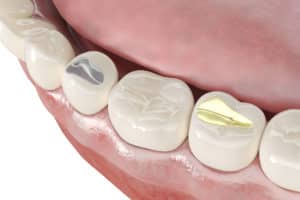The go-to solution for cavity treatment, fillings ensure that Pennsylvanians can continue to smile brightly. Let’s embark on a journey to explore the world of dental fillings, the importance of your toothbrush and toothpaste, and the role of family dentists in safeguarding your oral health.
Understanding Tooth Decay: The Invisible Enemy

Tooth decay, often manifesting as cavities, is the result of harmful bacteria in the mouth converting sugars from our food into acids. Over time, these acids erode the tooth’s enamel, leading to:
- Pain: A decaying tooth can be quite painful, especially when consuming hot or cold foods.
- Sensitivity: The tooth becomes more sensitive to temperature changes.
- Discoloration: Decay can lead to unsightly brown or black spots on the tooth.
The good news? With timely intervention, tooth decay can be effectively treated, and the tooth can be saved.
Enter the Dental Filling
A dental filling is a procedure where the decayed portion of the tooth is removed, and the area is then filled with a suitable material. This not only stops the decay but also restores the tooth’s function and appearance. Here’s what you need to know:
- Materials: Fillings can be made from various materials, including amalgam, composite resin, gold, or porcelain. The choice often depends on the tooth’s location, the extent of decay, and patient preferences.
- Procedure: The dentist first numbs the area, removes the decay, cleans the cavity, and then fills it. It’s a relatively quick and painless procedure.
- Longevity: With proper care, dental fillings can last for many years, providing a durable solution to tooth decay.
The Dynamic Duo: Toothbrush and Toothpaste

While dental fillings are effective, prevention is always better than cure. Enter the dynamic duo of oral care: your toothbrush and toothpaste.
- Toothbrush: It’s your primary weapon against plaque and bacteria. Opt for a brush with soft bristles and ensure you replace it every 3-4 months or sooner if the bristles are frayed.
- Toothpaste: It works in tandem with your brush to clean teeth and protect against decay. Look for toothpaste with fluoride, a mineral that strengthens tooth enamel and fights cavities.
Remember, brushing twice a day and flossing regularly can significantly reduce the risk of tooth decay.
The Role of Family Dentists in Pittston, PA
In the fight against tooth decay, family dentists play a pivotal role. Here’s why:
- Regular Check-ups: Routine visits to a family dentist can help detect and treat cavities early, preventing more extensive damage.
- Professional Cleaning: Even with diligent brushing, some plaque can be hard to remove. Professional cleanings ensure your teeth are thoroughly cleaned.
- Personalized Care: Family dentists often build long-term relationships with patients, offering tailored advice and treatments. The team at Casey Dental exemplifies this personalized approach.
Navigating Dental Insurance in Pennsylvania
Dental procedures, while essential, can sometimes strain the wallet. Here’s where dental insurance comes in:
- Coverage: Most dental insurance plans cover a significant portion of basic procedures like fillings. It’s advisable to check with your provider for specifics.
- Payment Plans: Many dental clinics, including Casey Dental, offer flexible payment options, ensuring that finances don’t hinder your access to quality care.
- Investment in Health: Always remember, spending on dental health is an investment in your overall well-being. Regular check-ups and treatments not only ensure a beautiful smile but also have broader health implications.
The Lifespan of Dental Fillings: How Long Do They Last and How Often Can a Tooth Be Filled?
In the realm of dental care, fillings are akin to knights in shining armor, rescuing teeth from the clutches of decay. But like all heroes, they too have their limits. One of the most common queries patients have is about the longevity of dental fillings and how many times a single tooth can be filled. Let’s delve into these questions and uncover the answers.

The Longevity of Dental Fillings
The lifespan of a dental filling largely depends on the material used, the location of the filling, and individual oral care habits. Here’s a general breakdown:
- Amalgam Fillings: Often referred to as silver fillings, they can last anywhere from 10 to 15 years, sometimes even longer. They’re durable and can withstand the chewing forces, especially in the back teeth.
- Composite Resin Fillings: These tooth-colored fillings blend seamlessly with your natural teeth. Typically, they last about 5 to 7 years, but with meticulous care, their lifespan can be extended.
- Gold Fillings: While more expensive, gold fillings are incredibly durable, lasting upwards of 15 to 20 years or more.
- Porcelain Fillings: Similar to gold in terms of cost, porcelain fillings can last between 15 to 20 years.
It’s essential to note that while these are general guidelines, the actual lifespan of a filling can vary based on factors like oral hygiene practices, dietary habits, and even the skill of the dentist who placed the filling.
How Many Times Can a Tooth Be Filled?
The number of times a tooth can be filled isn’t set in stone. It largely depends on the extent of the decay and the amount of healthy tooth structure remaining. Here’s what you need to know:
- Refilling: Over time, a filling might wear out, crack, or fall out. In such cases, the dentist will remove the old filling, clean out any new decay, and place a new filling.
- Recurrent Decay: If decay forms around an existing filling, the dentist might need to replace the filling with a larger one.
- Structural Limits: Each time a tooth is filled, some of its natural structure is lost. If a tooth undergoes multiple fillings and loses too much of its original structure, more comprehensive treatments like crowns or even tooth extractions might be necessary.
In Conclusion
Tooth decay might be a formidable foe, but with the right tools and allies, it’s a battle we can win. Dental fillings offer a robust solution to cavities, ensuring that the residents of Pennsylvania can continue to smile with confidence.
Coupled with the diligent use of a toothbrush and toothpaste and regular visits to a trusted family dentist, tooth decay can be kept at bay. And when it comes to payments, flexible options and insurance coverage ensure that quality dental care is accessible to all.For more insights and advice on dental health, don’t forget to peruse the Casey Dental Blog. Here’s to a lifetime of healthy smiles!






